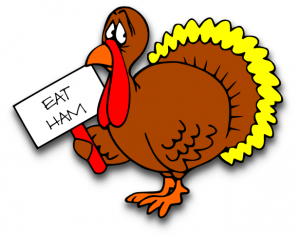 There are plenty of great reasons to fry your turkey. Do it right you’ll end up with a beautiful golden brown bird, with crispy skin and juicy white meat. There are plenty of recipes available, just pick one that sounds best to you. But frying a turkey can be a dangerous undertaking, and you need to follow some basic turkey frying safety tips.
There are plenty of great reasons to fry your turkey. Do it right you’ll end up with a beautiful golden brown bird, with crispy skin and juicy white meat. There are plenty of recipes available, just pick one that sounds best to you. But frying a turkey can be a dangerous undertaking, and you need to follow some basic turkey frying safety tips.
* Make sure the turkey (and oil) will fit in your fryer!
The first step in frying your bird is to make sure that both turkey and oil will fit in your pot. To see how much oil you will need, do a test run using water. Put your turkey in the fryer, fill with water until the turkey is submerged by an inch or two, remove the turkey and THEN measure how much water you used! That’s a reasonable estimate of how much oil you need to fry the turkey in You certainly don’t want oil overflowing onto the burner when you actually put the turkey into the fryer.
* Check that you have enough propane to do the job.
Not really a safety tip, but check the tank a couple of days before Thanksgiving. It will be much easier to get a refill if you don’t wait until Thanksgiving day!
* NEVER, EVER Fry your Turkey INDOORS!!!
Not even in the garage! Turkey fryer fires cause about $15 million in property damage each year from people frying turkeys to close to or inside a structure. Don’t become part of that statistic.
* Make sure your turkey is completely thawed & dried.
Let the bird get up to room temperature before you immerse it. Placing a partially thawed or frozen turkey in the fryer will cause the oil to splatter and cause severe burns.
* Wear LONG sleeves and GLOVES during cooking.
Spattering oil will burn exposed skin.
* In deep frying, the oil is heated to over 350° and is very combustible.
If your oil gets too hot, it can ignite. Even if it doesn’t ignite, if it reaches its smoke point, it may ruin your dinner. Think about using canola oil which has a higher smoke point.
* The fryers use a LOT of oil, generally 5 or more gallon.
When you are putting the turkey in (or pulling it out) use extreme caution to be sure it is not dropped back in, splattering hot oil everywhere.
* Rethink your frying plans if it is raining or snowing.
If rain or snow hits the hot oil, it may splatter or turn to steam and cause burns.
For more information, visit the National Fire Protection Association at http://www.nfpa.org
